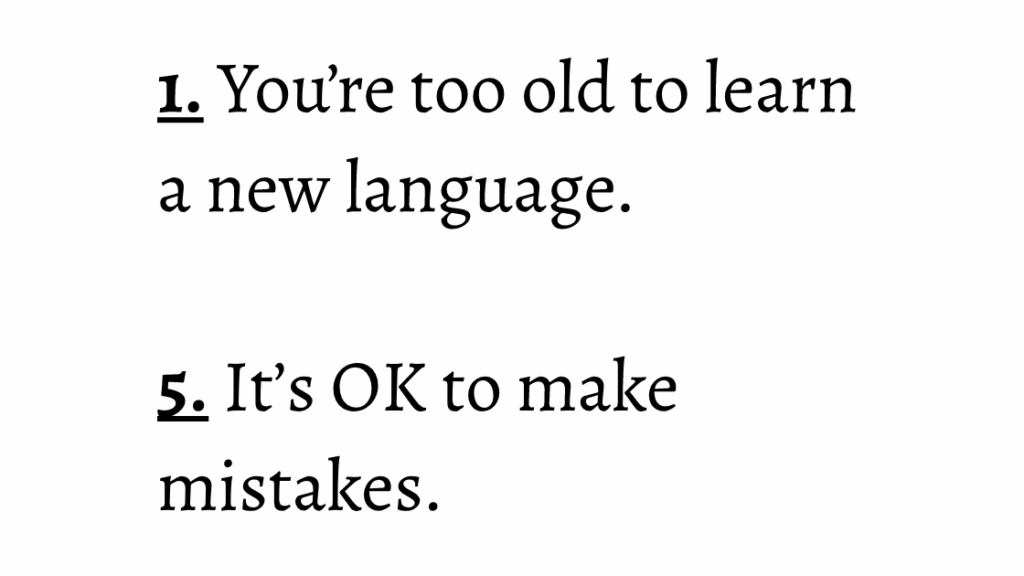Embarking on a journey to learn a new language is an exciting endeavor, but it’s not without its challenges and misconceptions. In the vast landscape of language learning advice, numerous myths can often mislead and discourage aspiring learners. From the belief that children learn languages faster than adults to the notion that immersion is the only effective way to become fluent, these myths can hinder progress and lead to frustration. In this blog post, we’ll delve into five common language learning myths and debunk them with evidence and practical insights. Whether you’re a seasoned language learner or just starting out on your linguistic adventure, understanding and dispelling these myths is essential for achieving success in mastering a new language.
1. You’re too old to learn a new language.
People often say that kids pick up languages faster than adults, pointing to immigrant children who learn English without an accent and help their parents communicate at places like the doctor’s or dentist’s office. This idea comes from the “critical period hypothesis,” suggesting that children learn languages better because their brains are more flexible. However, this theory has been questioned since it was proposed, and studies have shown that teenagers and adults actually perform better than young kids in controlled learning settings. Also, the belief that younger kids learn languages faster than older ones is a myth. In summary, age isn’t a barrier to learning a new language, so don’t let that stop you.
2. The best way to learn is to live in a foreign country.
Many people believe that to learn Spanish, going to Spain is the best option. It sounds good, but moving to a new place without knowing some grammar could lead to developing bad language habits. Even though you might think you’ll get better over time, consider how many people who move to a new country still use incorrect phrases after many years. Without strong motivation, moving to a new country doesn’t guarantee you’ll learn a new language. It might be wiser to practice at home first, where you have the time and freedom to learn proper grammar and sentence structure.
3. If you listen to a language every day, you’ll learn it by osmosis.
You might feel tempted to just listen to a local language radio channel and hope you’ll absorb the language effortlessly. But successful language learning requires a combination of activities: reading, writing, listening, and speaking. While passive learning like listening can improve your accent and pronunciation, research indicates it’s not enough on its own to truly learn a new language.
4. Pronunciation doesn’t need active work.
A lot of language learners think their pronunciation is good enough just because their teacher doesn’t correct them. But the reality is, most teachers only address the most obvious pronunciation errors. Unless you’re getting private tutoring, teachers usually don’t have the time to focus on each student’s pronunciation during class. That’s why pronunciation tends to be the most overlooked aspect of language learning. To improve, practice speaking with native speakers outside of class and aim for a pronunciation that’s as close to native as possible. Listening to local language radio, TV shows, and movies can really help with this.
5. It’s OK to make mistakes.
When we’re kids, we’re often encouraged to participate in class with the reassurance that it’s okay to make mistakes. But in language learning, mistakes can hold you back. Every time you use incorrect grammar, you’re more likely to repeat the same error. Some learners might rush to learn as much as possible quickly, but there’s a big gap between being fluent with mistakes and being fluent without them. It’s much harder to correct mistakes later than it is to learn correctly from the start. Take the time to understand grammar and construct proper sentences. It might be a slow process, but it’s the only way to truly become fluent.







